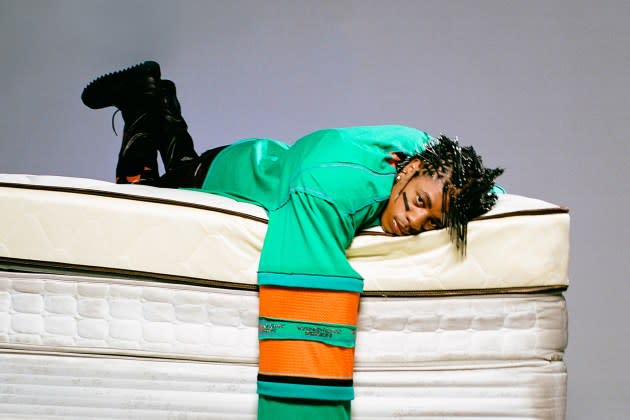Teezo Touchdown’s Hollow Hype Machine
- Oops!Something went wrong.Please try again later.

In his early videos, the musician Teezo Touchdown mostly appeared in his front yard, standing sort of mawkishly in a way that brings to mind Edward Scissorhands and sporting the now-signature metal nails that adorn his hair. There, he would perform snippets of mostly acoustic, minimal-sounding pop-punk ballads that possessed a bleeding earnestness, almost childlike in their sincerity. Songs like the treacly but heartfelt “Strong Friend,” which doubled as a kind of PSA for mental health awareness. For a long time on Instagram, the primary distribution mechanism for these video snippets, Teezo’s bio read: “Don’t worry, you’re early.” And indeed, the 30-year-old artist has succeeded in capturing the kind of fame best fostered on the platform. With an adjacency to a seemingly endless Rolodex of in-demand stars, Teezo Touchdown has managed to become the music industry’s influencer du jour, appearing on the social feeds of Tyler, the Creator, Drake, and others. He was even featured on “Modern Jam,” from Travis Scott’s latest album, Utopia.
In those arenas, Teezo Touchdown’s offbeat sensibility offers a compelling enough foil to the polished norms of contemporary rap. His vocal acrobatics bring about some of the most interesting and textured moments on all of Scott’s Utopia and even paired next to rap’s foremost eccentric in Tyler, the Creator, whom Teezo toured alongside last year, his willingness to delve into unconventional vocal flourishes and stream-of-consciousness wordplay proffers him a novelty that, on its own, grows tiresome quickly. Such is the case with Teezo’s debut, Do You Sleep at Night, released last week. Unlike in the small doses he’s teased over the past few years, here Teezo attempts to build a coherent universe around his delicately constructed persona. The result is a smattering of familiar sentiments and sounds that struggles to offer anything more than a handful of clever ideas executed with big-budget maximalism.
More from Rolling Stone
'San Francisco Sounds' Reveals the Discovery of Janis Joplin
Composer: 'Oppenheimer' Score Goes Beyond What's 'Humanly Possible'
Album opener “OK” has the defiant, anthemic spirit of Jimmy Eat World or Sum 41, though it is quickly derailed by songwriting that straddles too close to parody. “Life is a movie that you can’t find bootlegged on someone’s Reddit/My life is a movie where everybody’s hand I shake ends up in the credits,” Teezo sings with a sped-up delivery reminiscent of System of a Down’s Serj Tankian. Thematically, the album is mostly concerned with achieving greatness against the odds. Most of the songs essentially tell the same story: Don’t listen to the people who doubt you. That’d be all fine and good were it not so repetitive. “Uh-Huh, OK/I’m gonna do it anyway,” he sings on the chorus of “OK.”
Even on the R&B leaning “You Thought,” featuring Janelle Monáe, a decent enough idea comes just shy of overstaying its welcome, in large part thanks to Monáe’s vocals breaking up the monotony of Teezo’s one-dimensional quirky charm. On “UUHH,” he’s pantomiming sex with lines like “First I’m gonna, ‘Uh’/Then I’m gonna, ‘Uh-uh, uh-uh’,” which would admittedly sound more ridiculous were Teezo not a genuinely gifted singer. But there’s only so much that can make up for lyrics like, “And that’s gon’ make you, ‘Uh-uh-uh.’”
Teezo does find an effective R&B register on the Fousheé-assisted “Sweet,” where his vocal range offers a melodic balance with Fousheé’s silky delivery. On the album’s brightest moments, Teezo finds a comfortable pocket in classic, funk-inspired grooves that allow his bold declarative mantras an appropriate sense of levity. Like on the short but sweet “Nu Nay,” where Teezo’s smart-aleck writing style finds its place on the dance floor. Still, the album feels overall uneven, with moments like the Guns N’ Roses-sounding “Stranger” or the album’s closing track, “The Original Was Better,” coming off more interpretive than generative.
In a recent interview, Teezo says he considers himself a new genre called “Rock & Boom,” an amalgam of rock & roll and boom-bap rap. It’s an interesting proposition on paper, but one that in practice feels like hollow marketing. The past year has seen an existential mood overcast the rap world as its commercial dominance appears to be on its last leg. Lil Yachty ruffled feathers by insinuating his desire to be seen as more than just a SoundCloud rapper, and much of Teezo’s hype seems centered around an allegedly brilliant “genre-bending” endemic to his music. Except, Do You Sleep at Night offers little in terms of actual ingenuity. Instead, it presents a smattering of existing tropes thrown at the wall with little in terms of depth. Being “different” doesn’t always mean genius.
Best of Rolling Stone
